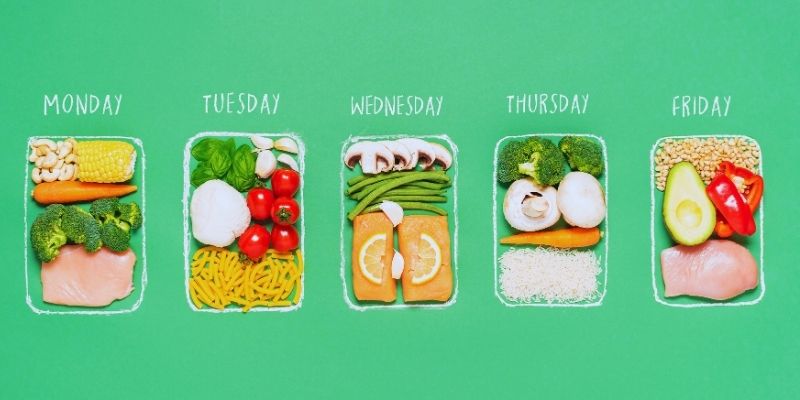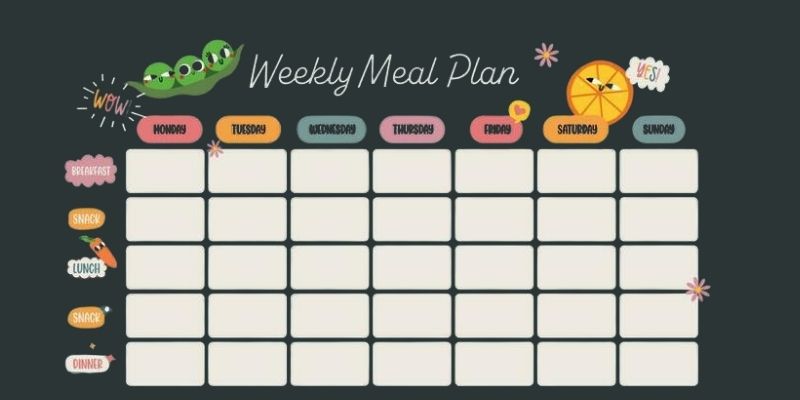Weekly meal planning can feel overwhelming, especially when life gets busy. But using weekly meal planning ideas helps you stay organized, save time, and eat better. Creating a system for recipes, ingredients, and prep makes your routine more efficient. With healthy meal prep techniques, you reduce last-minute choices and cut down on food waste. You'll save money and enjoy home-cooked meals with less stress.
A reliable planning method keeps you focused on your health and nutrition goals. This guide shares smart strategies that take your planning to the next level. Learn how to shop better, prep faster, and stay organized throughout the week. Build better habits and transform your kitchen routine with easy, effective planning steps.

Start with a Weekly Meal Calendar
Keeping a calendar lets you quickly view your whole week. Select a meal plan style that fits your schedule. Every day, write down breakfast, lunch, and dinner meals. On hectic days, schedule simpler meals; on leisurely days, plan more difficult ones. Easily access the calendar by hanging it on your fridge. Involve your family in the meal-planning process. They can provide insightful commentary and lighten the process. Often, to prevent boredom, rotate your preferred foods.
Think about leftovers and cleverly rework them the next day. Involve your family in the meal-planning process. Always allow your calendar room for adaptation. If things change, modify the meals. Note foods that tasted good—plan to use these notes in the future. A well-organized schedule saves weekly time. Consistency will increase confidence and help one to develop a habit of planning. Keep your food calendar customized to your demands and practical.

Build a Core List of Go-To Recipes
Organizing your favorite recipes into a small group helps you to plan more easily. Choose quick, delicious dishes approved by your family. Choose foods with few ingredients yet great flavor. Arrange them using an app or recipe binder. Add breakfast, lunch, and dinner ideas for variation. Especially useful are recipes, including overlapping ingredients. Create several recipes using the same meats or vegetables. It ensures less food waste and decreases prep time.
Choose foods that would be great leftovers for tomorrow. One fresh recipe every week will help to keep things interesting. Look for foods that fit your dietary objectives. Select simple, basic cupboard item meals that are prepared quickly—sort according to vegetarian, gluten-free, and dairy-free tags. Notes on cooking times and serving quantities should abound. Simplifying your selections can ease meal planning anxiety. Review the list many weeks to keep developing and updating. Allow your basic recipes to direct every weekly agenda.
Prep Ingredients in Batches Ahead of Time
Over the week, batch preparation saves a lot of time. First, cut vegetables ahead of time for rapid access. Clear containers will help you to see and preserve them fresh. Cook quinoa or rice in larger quantities. Sort them into little containers for several meals. For quick assembly, pre-cook proteins, including beans or chicken. Advance salad greens and herb washing and drying. Ahead for flavor increases, make sauces or dressings. Save fruit, such as chopped and ready or boiled eggs, for snacking.
Date everything so you may properly track freshness. For increased storage and longevity, use glass containers. Stow everything in an orderly manner in the refrigerator for simple access. Maintaining concentration while cooking requires a pre-list. Decide one or two days a week to finish your prep. For many, Sunday and Wednesday fit rather nicely. Regular preparation reduces stress and promotes more success. Maintaining organization at every stage will save time.
Shop Smarter with a Master Grocery List
One starts smart shopping with a thorough grocery list. Base your list on the scheduled dinners for the next week. Sort it along lines of produce, dairy, and grains. Shopping is faster and more efficient this way. Keep pantry basics always restocked. Before shopping, always clean your kitchen. Steer clear of purchase of already owned goods. Keep to your list to prevent going over budget. Shopping deliberately helps you to keep your spending under control. Sort things according to store layout to cut down time. For often-used products, buying in bulk can help.
Manage your list simply using a phone app. If certain things are for several meals, note them. Try not to shop hungry to cut spontaneous purchases. If you have limited time, think about shopping online—Plan convenience-based delivery or pick-up. Track your expenditures by reviewing your receipts every week. Over time, honing your list helps you to schedule your meals better. Every wise decision soon adds up.
Keep Your Fridge and Pantry Organized
Your weekly plans are supported in part by a clean kitchen. Clear containers help to find food that has been kept easily. Track everything with labels and dates. It's like things in the refrigerator. Separate dairy, fruit, and cooked food products. Arrange older goods in front so they get used first. Weekly check for expired goods and throw them away. For categories in the pantry, utilize baskets or containers. Organize canned items, snacks, and cereals in separate spaces.
For dry things like rice or oats, use transparent jars—sort spices quickly by alphabetical order. Put a notebook close by to mark running-out items. Usually, clean shelves help to maintain the neatness of storage spaces. Avoid the crowd to stop forgotten meals. Your ingredients will be more likely to be used the more they are apparent. Know where items are to save cooking time. Clean surroundings also promote healthy eating habits. In a clean, orderly kitchen, meal prep gets simpler.
Mix Flexibility with Routine for Long-Term Success
A well-balanced strategy calls for both structure and adaptability. Follow your strategy and leave room for change. Schedules change, and life becomes busy. Your plan should fit your reality. Suppose you run out of time or energy, swap dinners. Plan one or two backup dinners per week. For last-minute adjustments, freezers are quite handy. Use versatile recipes with simple ingredient substitutions. Grain bowls or stir-fries, for instance, fit rather well.
Based on availability or season, rotate foods. Routines help create habits more quickly. Prepare for consistency using the same days every week. Go over your week to see what went and what didn't. Change your plans in line with your notes. If nothing goes exactly, relax. Over time, little adjustments might result in major gains. Celebrate your development and maintain enjoyment of it. Regular effort makes planning second nature. Included in your success plan should be flexibility.
Conclusion
Smart weekly meal planning helps you stay organized and reduce stress every day. A flexible and consistent strategy supports better nutrition and time-saving habits. Apply healthy meal prep techniques and stick with weekly meal planning ideas that match your lifestyle. Shop wisely, prep ahead, and keep your kitchen in order. Over time, these actions become routine and easier to maintain. You'll eat healthier meals, waste less food, and feel more in control. Savor the benefits of an intentional meal plan style that improves your week and supports your health goals.












